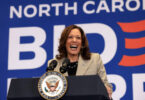By Sebastian Jaramillo
Boston University Statehouse Program
BOSTON — Passengers on the MBTA’s Route 28 bus say they enjoy the opportunity to ride for free under a pilot program greenlighted for two more years this week by Mayor Michelle Wu, but they also have some concerns.
In a series of random interviews of people waiting for and riding the bus, riders said they are aware someone is eventually going to have to pay the cost of their rides – the two-year pilot will be paid for with $8 million in federal funds that will eventually run out — and some said they are concerned about illicit activities they have witnessed on the bus.
The fare-free pilot on the Route 28 bus began in August. Starting next month, it will be extended another two years and expanded to include the Route 23 and 29 buses. Running from Ruggles Street to Mattapan, Route 28 serves the communities of Dorchester, Roxbury, and Mattapan, whose populations are made up of majority Black and Brown residents with low incomes, according to a 2019 report from Livable Streets, a public transportation advocacy group.

Katrina McDonald takes the bus regularly and said she sees the bus as an essential service for students, the elderly, and especially for people like herself who live paycheck to paycheck. She said the elimination of fares is a financial boost. “That’s more money into our pocket,” she said.
McDonald said she knows the federal money will eventually run out and some other resource will need to be tapped to keep it going. “If it’s a tax increase, a minor adjustment wouldn’t hurt,” McDonald said. “Now, if they do too much, then no, it’s not worth it.”
McDonald also favors another option being considered by the MBTA — giving low-income people like her a discounted fare.
Fabian Lambright, who waited for the bus with McDonald, said free buses could be a significant asset for middle and high school students.

“You got the kid that’s going to school from Mattapan. Some of the kids, they don’t have passes to get on the bus so it being free, I think, that’s a definite good look for the kids as well,” Lambright said.
Brian Greene supported himself with a wooden cane as he sat up and scanned the street ahead for the incoming bus. A cup of coffee and his breakfast from Dunkin’ kept him company on the bench. He knows who should pay for the pilot.
“I think all the buses should be free and the wealthy should pay for it,” he said.
Disgruntled by his long workdays and lack of faith in MBTA leadership, a bus driver who chose to remain anonymous said he would prefer the pilot not be extended. He said frequent arguments among passengers and an over-crowded bus have made his job harder since the pilot was instituted.
One man who takes the bus several days a week to visit his girlfriend in Mattapan said he worries the transit system won’t have enough money to operate properly without fare revenue.
Stacy Thompson, executive director of Livable Streets, said that fears over illicit activities on fare-free buses were one of the prominent excuses used to halt the progress of these pilots. But she rejected the notion.
“We see it as a total sort of false narrative,” she said. “The only challenge that I have perceived is the reticence of the MBTA to make a good faith effort to get this done.”
Instead of spending $1 billion on a new fare collection system, Thompson believes the MBTA should focus on implementing more fare-free buses, which require no additional staffing or equipment.
“The hurdle is perception and political and not actually technical,” she said.
This article originally appeared in the CommonWealth Magazine




